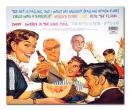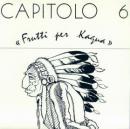Si la cruz llegó a este mundo
en brazos de un batallón
y una guerra de exterminio
fue la cristianización,
¿quién me salva de tenerle
tirria a la cruz y al cañón?
Si al obrista de mi tierra
se le da la absolución
y cuando muere de viejo
se le da la extremaunción.
¿quién ampara a un pobre diablo
de esta confabulación?
A mí no me cuentan cuentos,
tengo años de actuación,
misionarios y milicos
trastornan nuestra nación.
Unos con el purgatorio
otros con el paredón.
Calladito el auditorio,
denle tiempo a este cantor.
Ahora canto un canto nuevo
que es mejor que el anterior.
En los tiempos que vivimos
todo cambia de color.
Las velitas de la iglesia
empiezan a parpadear,
fieles bajan la cabeza,
un cura sube al altar.
Y la boca se relame
satisfecho el oficial.
Ahora el cura se da vuelta
y se pone a predicar.
Dice que el pueblo está hambriento
y le falta libertad.
Llegará la soldadesca
a enseñarle la verdad.
Las velitas ya no arden,
duelo en la catedral.
En el reino de los cielos
toma el mando un General,
y el alma del buen cristiano
le abre la puerta a Satán.
en brazos de un batallón
y una guerra de exterminio
fue la cristianización,
¿quién me salva de tenerle
tirria a la cruz y al cañón?
Si al obrista de mi tierra
se le da la absolución
y cuando muere de viejo
se le da la extremaunción.
¿quién ampara a un pobre diablo
de esta confabulación?
A mí no me cuentan cuentos,
tengo años de actuación,
misionarios y milicos
trastornan nuestra nación.
Unos con el purgatorio
otros con el paredón.
Calladito el auditorio,
denle tiempo a este cantor.
Ahora canto un canto nuevo
que es mejor que el anterior.
En los tiempos que vivimos
todo cambia de color.
Las velitas de la iglesia
empiezan a parpadear,
fieles bajan la cabeza,
un cura sube al altar.
Y la boca se relame
satisfecho el oficial.
Ahora el cura se da vuelta
y se pone a predicar.
Dice que el pueblo está hambriento
y le falta libertad.
Llegará la soldadesca
a enseñarle la verdad.
Las velitas ya no arden,
duelo en la catedral.
En el reino de los cielos
toma el mando un General,
y el alma del buen cristiano
le abre la puerta a Satán.
inviata da Dq82 - 8/11/2017 - 09:33
Lingua: Inglese
Traduzione inglese da cantoscautivos.org
I don’t want to exaggerate but Camp Melinka became not only a factory that produced handicrafts and a performance hall but also a university. Every day there were classes to learn foreign languages, art, medicine or literature. Solar ovens were built. Talks were given on arachnology. Literacy programs were offered. For a twenty something year-old like me, interested in learning greater depth about Latin American history, history professors would share a round of mate in the cabins, and happy to also share their knowledge free of charge. Listening to one of those professors I learned about Father Bartolomé de las Casas, a priest who lived in Central America and earned the title of Defender of the Indians during the harshest period of the Spanish Conquest. His life was marked by defeat. He was unable to stop the abuses committed with the consent of the Catholic Church, which was his spiritual home.
I couldn’t stop thinking about him until someone finally lent me the camp’s only guitar and I wrote this song. Although his criticism addressed a system that existed a very long time ago, it seemed to me still absolutely valid. Father Bartolomé opposed giving absolution to slave owners. Where was the Father Las Casas of Chile to refuse to absolve my torturers?
Songs are good for releasing a singer from tempestuous doubts and allowing him to denounce injustice openly, with no qualms. In other words, the way things are painted when we see the world in black and white. Joking aside, the positive medicinal effect of music therapy is undeniable. Beyond the value a songwriter gives a song or that others may give, song-writing was a discovery that helped me, above all, to give meaning to my life as prisoner.
“Curas y milicos” is one of 27 songs contained in my record Documento (1986) that I produced ten years after I began my exile in Germany, which compiles all these songs that were inspired by my life as prisoner.
I don’t want to exaggerate but Camp Melinka became not only a factory that produced handicrafts and a performance hall but also a university. Every day there were classes to learn foreign languages, art, medicine or literature. Solar ovens were built. Talks were given on arachnology. Literacy programs were offered. For a twenty something year-old like me, interested in learning greater depth about Latin American history, history professors would share a round of mate in the cabins, and happy to also share their knowledge free of charge. Listening to one of those professors I learned about Father Bartolomé de las Casas, a priest who lived in Central America and earned the title of Defender of the Indians during the harshest period of the Spanish Conquest. His life was marked by defeat. He was unable to stop the abuses committed with the consent of the Catholic Church, which was his spiritual home.
I couldn’t stop thinking about him until someone finally lent me the camp’s only guitar and I wrote this song. Although his criticism addressed a system that existed a very long time ago, it seemed to me still absolutely valid. Father Bartolomé opposed giving absolution to slave owners. Where was the Father Las Casas of Chile to refuse to absolve my torturers?
Songs are good for releasing a singer from tempestuous doubts and allowing him to denounce injustice openly, with no qualms. In other words, the way things are painted when we see the world in black and white. Joking aside, the positive medicinal effect of music therapy is undeniable. Beyond the value a songwriter gives a song or that others may give, song-writing was a discovery that helped me, above all, to give meaning to my life as prisoner.
“Curas y milicos” is one of 27 songs contained in my record Documento (1986) that I produced ten years after I began my exile in Germany, which compiles all these songs that were inspired by my life as prisoner.
PRIESTS AND SOLDIERS
If the cross came to this world
in the arms of a battalion
and a war of extermination
was Christianisation,
who can save me from bearing
a grudge against the cross and cannon?
If the hired hand of my land
is absolved
and when he dies of old age
they give him the last rites
who protects a poor devil
from such a confabulation?
Don’t tell me tales,
I have seen many things in my time:
missionaries and military
disturb our nation.
The first, with purgatory,
the second, with firing squads.
Quiet down, audience,
give this singer time.
Now I’ll sing a new song
that’s better than the previous one.
In the times we are living
everything changes colour.
The little candles in the church
begin twinkling
the faithful lower their heads
a priest goes up to the altar.
And the official
licks his mouth, satisfied.
Now the priest turns around
and begins to preach.
He says the people are starving
and lack freedom.
Soldiers will come
to teach him the truth.
The candles stopped burning,
the cathedral is cloaked in mourning.
In the kingdom of the skies
A General takes charge
and the good Christian’s soul
opens the door to Satan.
If the cross came to this world
in the arms of a battalion
and a war of extermination
was Christianisation,
who can save me from bearing
a grudge against the cross and cannon?
If the hired hand of my land
is absolved
and when he dies of old age
they give him the last rites
who protects a poor devil
from such a confabulation?
Don’t tell me tales,
I have seen many things in my time:
missionaries and military
disturb our nation.
The first, with purgatory,
the second, with firing squads.
Quiet down, audience,
give this singer time.
Now I’ll sing a new song
that’s better than the previous one.
In the times we are living
everything changes colour.
The little candles in the church
begin twinkling
the faithful lower their heads
a priest goes up to the altar.
And the official
licks his mouth, satisfied.
Now the priest turns around
and begins to preach.
He says the people are starving
and lack freedom.
Soldiers will come
to teach him the truth.
The candles stopped burning,
the cathedral is cloaked in mourning.
In the kingdom of the skies
A General takes charge
and the good Christian’s soul
opens the door to Satan.
inviata da Dq82 - 8/11/2017 - 09:34
×
![]()










Documento
No quiero exagerar, pero el Campo de Melinka llegó a funcionar no solo como fábrica de artesanía y sala de espectáculos, sino que hasta de universidad. Todos los días se daban clases de idiomas, de astronomía, de artes plásticas, de medicina o literatura. Se construían hornos solares. Se ofrecían charlas de aracnología. Se desarrollaban programas de alfabetización. Para un veinteañero como yo, interesado en conocer más a fondo la historia americana, había profesores de americanismo que, si querían, te regalaban todo su conocimiento sin cobrarte entrada. Fue oyendo a uno de esos profesores que supe del Padre Bartolomé de las Casas, un religioso que vivió en Centroamérica y se ganó el título de Defensor de los Indios en el período más cruento de la Conquista. Su vida estuvo llena de derrotas. No logró impedir los excesos que se cometían con la aprobación de la Iglesia Católica, que era su hogar espiritual.
Yo no logré librarme de pensar en él hasta que conseguí que me prestaran la única guitarra y pude escribir esta canción. A pesar de que su crítica al sistema venía de un pasado muy lejano, a mí me pareció tener la vigencia más absoluta. El Padre Bartolomé se opuso a darle la absolución a los esclavistas. ¿Dónde estaba el Padre de las Casas chileno que le negara la absolución a mis torturadores?
Las canciones son buenas para liberar al cantor de preguntas tormentosas y permitirle denunciar la injusticia sin tapujos, a calzón quitado, como diríamos en Chile. O sea, así como se pintan las cosas cuando uno ve el mundo en blanco y negro. Bromas aparte, no se debe ignorar el positivo efecto medicinal de esta terapia musical. Creo que escribir canciones, más allá del valor que se les quiera o se les pueda encontrar, fue un descubrimiento que me ayudó, más que nada, a darle un sentido a mi vida de prisionero.
“Curas y milicos” es uno de los 27 temas contenidos en mi disco Documento (1986) que grabé al cumplirse diez años de mi exilio en Alemania y que compila todas esas creaciones que nacieron de mi experiencia como prisionero.
cantoscautivos.cl